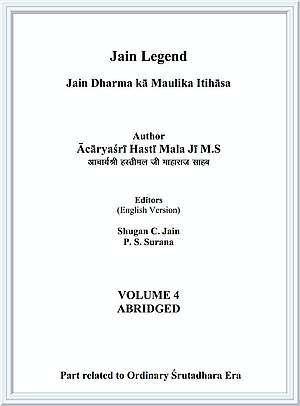| Birth | V.N. 1407 |
| Initiation into monkhood | V.N. 1449 |
| Attained Ācārya status | V.N. 1474 |
| Heavenly Abode | V.N. 1494 |
| Period of household life | 42 years |
| Period of ordinary monk | 25 years |
| Period of Ācārya status | 20 years |
| Complete monkhood | 45 years |
| Life span | 87 years |
When Ācāryaśrī Kalaśaprabha attained heavenly abode in V.N. 1474, the four-fold order appointed Śrī Umaṇaṛṣi as the 48th successor-pontiff of the congregation.
Though he held the post of ācārya at a time when the material offering based traditions like Temple dwellers, dwellers of monastery, Śvetāmbara Bhaṭṭārakas, Digambara Bhaṭṭārakas et al were in predominance, Umaṇaṛṣi untouched by their influence, strictly adhered to scripture-based pure code of conduct and encouraged his followers to practice the same, thus keeping the fundamental principles of spiritual purification alive.
In V.N. 1494, he attained Samādhi through saṃlekhanā-saṃthārā.
Political events during the time of Umaṇaṛṣi
During the pontificate of Śrī Umaṇaṛṣi, Kṛṣṇa, the 19th king of Rāṣṭrakūṭa dynasty defeated King Rājāditya Cola of Cola dynasty and King Vallāla of Kalacurī and protected the Jain monks and followers from severe atrocities that were being inflicting upon them. He acquired a standing in the annals of Jainism equal to that of Mahāmeghavāhana Bhikkhurāya Khāravela, the King of Kaliṃga, who protected the Jains against the atrocities of Puṣyamitra Śuṃga in the past.
Ācāryaśrī Jayasena, the 49th Pontiff of Lord Mahāvīra
| Birth | V.N. 1420 |
| Initiation into monkhood | V.N. 1465 |
| Attained Ācārya status | V.N. 1494 |
| Heavenly Abode | V.N. 1524 |
| Period of household life | 45 years |
| Period of ordinary monk | 29 years |
| Period of Ācārya status | 30 years |
| Complete monkhood | 59 years |
| Life span | 104 years |
During his 30 years tenure as ācārya, Jayasena too offered exemplary services to the four-fold Jain congregation. Despite the propagation and rampant growth of the material offering based traditions, Ācārya Jayasena was successful in upholding the basic principles of the four-fold congregation, which were once promulgated by Lord Mahāvīra during the inception of holy path (Tīrtha Pravartana Kāla) and keeping them alive. He ensured that the pure and perennial rivulet of the fundamental holy path of omniscient Lord Mahāvīra flows smoothly without any interruption.
The political situation during the tenure of Jayasena as ācārya
(V.N. 1494 To 1524)
The most powerful 'Rāṣṭrakūṭa' kingdom which protected the Jains and ruled in a righteous and moral way for about 250 years had come to an end in 1499.
Falgumitra, the 37th epochal-ācārya
| Birth | V.N. 1444 |
| Initiation into monkhood | V.N. 1458 |
| Period of ordinary monk | V.N. 1458 to 1471 |
| Period as epochal-ācārya | V.N. 1471 to 1520 |
| Period of household life | 14 years |
| Period of ordinary monk | 13 years |
| Period of epochal-ācārya status | 49 years |
| Heavenly abode | V.N. 1520 |
| Life span | 76 years, 7 months 7 days |
It was mentioned that Daśāśruta skandha was lost after the demise of Śramaṇa Falgumitra.
Important events during his tenure
1. In V.N. 1520 during the regime of Āhavamalla Tailapa Cālukya Cakravartī, the poet Ratna, who was the poet laureate of Commander Tailapa, wrote "Ajita Tīrthaṃkara Purāṇa Tilakam".
2. During the same time, Tailapa's mother Atimabbe got a thousand copies of Śāntipurāṇa made and donated them at various parts of the country. She built about 1500 vasadis (residences around Jain temples). The four-fold congregation bestowed the title "Ghaṭāntakī Devī" upon her.
The invasion of India by Gajanavī Sultāna
In the year 977 AD (V.N. 1504) the Gajanī Sultāna Subuktagīna attacked Punjab. At that time Lahore state, which extended from Sarhind to Lamagāna and Multāna to Kashmir, was ruled by Jayapāla (son of Bhīma or Bhīmapāla) who stayed at the Fort of Bhatinda. Jayapāla, the King of Lahore fought bravely with the forces of the tyrant. After a fierce battle when Jayapāla found that his forces were getting seriously impaired, he made an alliance with Subuktagīna by accepting to pay tribute, gold, elephants etc. He instantly offered Subuktagīna 50 elephants and lot of gold coins and said that he would indemnify the balance amount to his men after reaching Lahore. Allured by the wealth that was being offered and apprehensive about the uncertainty of war, Subuktagīna had accepted the alliance. The king left a few of his men as captives with the Sultāna and proceeded towards Lahore along with some of Sultāna's associates and his own forces. After reaching Lahore, upon the advice of the Brahmin officials of his kingdom, the king had imprisoned the Sultāna's associates.
When the news reached Subuktagīna that Jayapāla had betrayed him, he set out from Gajanī towards Lahore with a powerful army. King Jayapāla also organised a confederacy along with the kings of Delhi, Kālaṃjara and Kannauja and with a huge army reached the battlefield. As a result of the new war strategies and modern arms and ammunitions used by the Sultāna, the army of Jayapāla fled from the battlefield. The army of Sultāna of Gajanī chased Jayapāla up to river Sindhu. In this manner Subuktagīna established his authority over the western regions of Sindh and left for Gajanī along with the wealth he amassed. He had posted an army of about 10,000 soldiers in Peshawar in order to maintain his strong hold and control over Sindh and the western regions.
Thus, after Sindh and the western regions, the Islamic rule spread even to the northern regions of India.
 Acharya Hasti Mala
Acharya Hasti Mala
